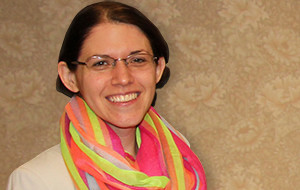 In early April, there was a knock at the side door of the classroom where Amy Absher was teaching one of her SAGES courses.
In early April, there was a knock at the side door of the classroom where Amy Absher was teaching one of her SAGES courses.
To the laughter of her students, Absher joked: “We’re not interested. We don’t want any.” The door then swung open, and in walked President Barbara R. Snyder to congratulate her on winning a 2016 Carl F. Wittke Award for Excellence in Undergraduate Teaching.
“I apparently ran away from the president because I was so surprised,” said Absher. “She found that funny.”
Absher cried as President Snyder read testimonials from students who had nominated her for the award, so moved that she had to sit down.
“My students keep bringing it up,” said Absher, a SAGES Fellow teaching history and composition courses. “It was a pretty uncool way to win an award.”
On Sunday, May 15, Absher will be recognized alongside English’s Jim Sheeler during commencement ceremonies.
An honor to teach
Burned in Absher’s memory is a remark that guides her teaching: One of her graduate school professors had called the profession “a sacred trust.”
“You’re given other human beings to teach and care for. That means you have to do a really good job. They’re relying on you to help prepare them for life,” said Absher, who earned her PhD at the University of Washington. “That in itself is an honor.”
On the first day of each course, Absher introduces herself to each student and memorizes their names. Together, they agree on classroom rules: Conversations must be inclusive and respectful, with students calling on each other to contribute and deciding where discussions go, while Absher moderates and makes a concerted effort to include international students.
“I don’t think anyone signs up for—or teaches—a class and hopes that it’s boring. People want to learn—including me,” she said. “A teacher is a student. You have to learn from students. You have to make mistakes. You have to be willing to try again.”
With writing as the cornerstone of SAGES courses, Absher meets at length with each student every other week to discuss and revise papers—sessions that can take hours.
When Absher is not in the classroom or with students, she conducts her own research: In 2013, her first book—The Black Musician and the White City: Race and Music in Chicago, 1900-1967, which looked at race through the eyes of the city’s African-American musicians who resisted segregation—was published by University of Michigan Press.
Absher’s next book—tentatively titled I am Fritzi Mann—uses the early 1920s murder of the titular figure to examine gender and violence against women in the decade.
Absher’s SAGES classes include:
- “Bring Out Your Dead”: Explores the connection between human history and pandemics. The class learns about the social response to plagues and how plagues drove forward scientific advancements. They also explore how medical systems buttressed imperial, racial, social and gender divides.
- “Murder In The Jazz Age”: There are gangsters and flappers. But there are also race riots, the red scare, and the radium girls. Students come to understand that the 1920s were not a throw-away decade in American history that took place between the more serious epochs of WWI and The Great Depression. Rather, it is the essential decade.
- “The Right Stuff”: What is courage? What does it take to push everything to the limits and then be able to pull it back in at the last moment? Are heroes born, made, or realized? This is a first-year seminar that promises an exploration of what it means to be human. The class comes to understand these topics by examining the early years of the history of NASA.
The Wittke award was established in 1971 in honor of Carl Wittke, a former faculty member, dean and vice president of Western Reserve University. The Wittke Award is presented each year to two Case Western Reserve faculty members during commencement.

